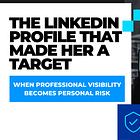Why We Trust Famous Faces
How Parasocial Relationships Make Us Vulnerable to Fake Endorsements and Romance Scams
We all like to think we wouldn’t fall for an obvious scam.
But when a celebrity’s face pops up on your feed, such as endorsing a product, sharing an opportunity, or even sliding into your messages, it hits differently.
That’s not an accident. Criminals know how powerful our “parasocial” connections with public figures can be, and they’re using that trust to push scams that cost people billions.
Regular readers know scams are a topic near and dear to us. We’ve written a lot about the latest scams and how they leverage the abundance of personal data to be more effective. We even wrote a (free) guide on how to Spot and Avoid AI Scams (get it here). We’ve also included a list of our top AI scam posts at the very end of this post.
In today’s guest post, Cyber Safety Watchdog breaks down:
How scammers weaponize celebrity impersonation
The psychology that makes it so effective
The red flags to watch for
If you’ve ever wondered how deepfakes, fake social media accounts, and too-good-to-be-true celebrity endorsements fit into the modern scam playbook, this post is for you.
And be sure to give Cyber Safety Watchdog a follow on Substack and subscribe to his newsletter. The psychology angle of this post made it fun to work on.
When Kelly Clarkson's face appeared in a Facebook ad promoting "the miracle weight loss pills that doctors don't want you to know about," something in my brain wanted to trust it. Even knowing it was obviously fake, I felt that familiar pull of celebrity credibility. This psychological phenomenon, our tendency to trust famous faces, has become one of cybercriminals' most effective weapons.
The Psychology of Parasocial Relationships
Parasocial relationships are one-sided emotional connections we form with media figures, celebrities, or influencers. First identified by psychologists Horton and Wohl in 1956, these relationships activate the same neural pathways as real friendships, triggering trust, familiarity, and emotional investment, despite never having met the person.
Social media has supercharged this effect. When we see daily Instagram stories from our favorite actor or regular TikTok or Instagram videos from an influencer, our brains process these interactions as genuine social connections. We begin to feel we "know" these people intimately, making us psychologically primed to trust their recommendations and respond to their apparent outreach. This is how my kids and I ended up at a Cantonese restaurant owned by one of the parents of famous YouTubers “Zack & Tee”. We had never eaten Cantonese food before and quickly realized we were in over our heads when we were served periwinkle snails as an appetizer. I am sure they are delightful but it was not something we were used to eating and were not quite up for the adventure at that time!
The parasocial effect is particularly powerful because it exploits fundamental human psychological needs:
Trust Transfer: We unconsciously transfer our positive feelings about a celebrity to whatever they're endorsing. If we trust Taylor Swift as a person, we're more likely to trust a financial opportunity that appears to come from her.
Social Proof: Celebrity endorsements serve as powerful social validation. Our brains interpret famous approval as evidence that "if it's good enough for them, it's good enough for me." This psychological mechanism is particularly exploitable because we're accustomed to seeing legitimate celebrity endorsements everywhere, from athletes promoting sports drinks to actors appearing in luxury watch advertisements. This constant exposure to real celebrity marketing makes it difficult for our brains to quickly distinguish authentic endorsements from fraudulent ones, especially when scammers use sophisticated design and professional-looking materials that mimic legitimate advertising campaigns.
Reciprocity Bias: When celebrities share personal content, we feel they've given us something valuable. This creates a psychological debt, we want to reciprocate by supporting their recommendations or responding to their requests.
The Cybersecurity Threat Landscape
Cybercriminals have weaponized these psychological vulnerabilities with sophisticated technical tactics:
Deepfake Technology
Advanced AI tools now allow scammers to create convincing video content featuring celebrities endorsing cryptocurrency schemes, investment opportunities, or miracle products. These deepfakes are becoming increasingly difficult to detect, requiring frame-by-frame analysis that most users won't perform.
Social Media Account Cloning
Criminals systematically harvest photos, videos, and personal information from celebrity social media accounts to create convincing duplicate profiles. They use these to initiate romance scams or promote fraudulent business opportunities, often targeting the celebrity's actual fanbase.
Verified Badge Manipulation
Scammers exploit the trust associated with verification badges by creating accounts with names and profile photos nearly identical to verified celebrities, counting on users not to notice subtle differences in usernames or follower counts.
Cross-Platform Orchestration
Sophisticated operations coordinate across multiple platforms, using fake celebrity endorsements on one platform to drive traffic to fraudulent websites, apps, or investment platforms hosted elsewhere.
Common Exploitation Scenarios
Investment and Cryptocurrency Scams
The most prevalent celebrity impersonation scams involve fake endorsements of cryptocurrency investments or trading platforms. Scammers create elaborate promotional materials featuring celebrities like Elon Musk, Mark Cuban, or Robert Kiyosaki promoting "exclusive" investment opportunities with guaranteed returns.
Red Flag Indicators:
Promises of guaranteed returns or "limited time" opportunities
Requests to transfer cryptocurrency or wire funds to unfamiliar accounts
Poor grammar or inconsistencies in supposedly professional communications
Pressure to "act now" or maintain secrecy about the opportunity
Romance Scams
Celebrity impersonation romance scams exploit some of our deepest psychological vulnerabilities. Criminals systematically target individuals experiencing loneliness, social isolation, or life transitions (divorce, loss of a spouse, empty nest syndrome) by creating fake profiles using stolen photos and videos from actors, musicians, or influencers.
These scams are particularly insidious because they prey on victims' need for connection and validation. Scammers craft communications that tell victims exactly what they want to hear, that they're special, understood, and worthy of a celebrity's attention. For someone feeling invisible or unvalued in their daily life, the idea that a famous person has noticed and chosen them can fulfill deep psychological needs and send basic logic out the window.
The criminals behind these operations often follow predictable patterns: they initiate romantic conversations with victims who are fans of that celebrity, gradually building emotional intimacy through shared interests and apparent personal revelations. They exploit the victim's existing parasocial relationship with the celebrity, transforming one-sided admiration into what feels like mutual romantic connection.
Technical Tactics:
Using AI-generated responses to maintain consistent personality traits
Leveraging publicly available information about the celebrity to add authenticity
Gradually escalating emotional investment before introducing financial requests
Using multiple communication channels to reinforce the fake relationship
Product Endorsement Fraud
Scammers create fake celebrity endorsements for everything from weight loss supplements to anti-aging creams, using convincing testimonials and doctored images to suggest celebrity approval.
Subscribe
Defensive Cybersecurity Strategies
Technical Verification Methods
Reverse Image Searching: Use Google Images or TinEye to verify whether celebrity photos are stolen from other sources. Legitimate celebrities typically have hundreds of search results showing the same images across multiple reputable sources.
URL and Domain Analysis: Examine links carefully for suspicious characteristics:
Misspelled domain names (facbook dot com instead of facebook dot com)
Unusual top-level domains (.tk, .ga, .cf instead of .com)
Shortened URLs that disguise the actual destination
HTTPS warnings or missing security certificates
Social Media Verification: Always verify celebrity accounts through official verification badges and cross-reference with their official websites. Check follower counts, posting history, and engagement patterns that would be consistent with a legitimate celebrity presence.
Website Security Assessment: Before engaging with any platform promoted by a supposed celebrity endorsement:
Check domain registration dates (new domains are suspicious)
Look for contact information and company details
Verify business licenses and regulatory compliance
Check online reviews and scam reporting databases
Behavioral Security Practices
Pause and Verify: When encountering any celebrity endorsement or communication, implement a mandatory cooling-off period. Legitimate opportunities don't disappear in hours. Scammers count on your acting impulsively without thinking.
Independent Research: Always research investment opportunities, products, or requests through independent sources, not just the materials provided by the supposed celebrity or their representatives.
Financial Isolation: Never share financial information, transfer money, or provide personal details based solely on celebrity endorsement or communication.
Network Verification: Consult with trusted friends, family members, or financial advisors before making decisions based on celebrity recommendations.
Building Psychological Resilience
Understanding the psychological mechanisms that make us vulnerable is crucial for developing immunity to these scams:
Awareness Training
Recognize that parasocial relationships, while psychologically real, don't create actual personal connections. The celebrities you follow don't know you personally and wouldn't reach out individually through social media or email. Stay educated on the latest scams and how to avoid them (Cyber Safety Watchdog can help with that)!
Critical Thinking Frameworks
Before responding to any celebrity-endorsed opportunity, ask yourself:
Why would this celebrity personally contact me?
What would they gain from helping strangers make money?
Does this opportunity make logical sense from a business perspective?
Are there independent, verifiable sources confirming this endorsement?
Why would a famous celebrity need money from me?
Emotional Regulation
When encountering exciting celebrity endorsements, practice emotional regulation techniques. Take time to let initial excitement subside before making any decisions. Scammers rely on immediate emotional responses that bypass rational analysis.
Subscribe
The Future Threat Evolution
As deepfake technology becomes more sophisticated and accessible, we can expect celebrity impersonation scams to become even more convincing. Future threats may include:
Real-time deepfake video calls featuring impersonated celebrities
AI-generated celebrity voices for phone-based scams
Highly personalized celebrity content targeted based on individual social media data
Integration of celebrity impersonation with other social engineering tactics
Conclusion
Our psychological tendency to trust and connect with celebrities represents a fundamental human trait that cybercriminals have learned to exploit with increasing sophistication. By understanding both the psychological vulnerabilities that make us susceptible and implementing robust technical verification practices, we can enjoy our parasocial relationships with public figures while protecting ourselves from those who would exploit these connections.
The key is recognizing that our emotional responses to celebrities, while psychologically valid, shouldn't drive our cybersecurity decisions. In the digital age, healthy skepticism isn't cynicism, it's survival.
Remember: If it seems too good to be true, even when endorsed by your favorite celebrity, it almost certainly is!
Special thanks to Secrets of Privacy for the opportunity to guest post and share their audience! I hope to see some of you over at Cyber Safety Watchdog where I share more scam alerts, red flags and insights on how to keep yourself (and your loved ones) safe online!
Friendly Ask
If you found this helpful or informative, chances are your friends and family will as well. Please share it with them to help spread awareness.
Looking for help with a privacy issue or privacy concern? Chances are we’ve covered it already or will soon. Follow us on X and LinkedIn for updates on this topic and other internet privacy related topics.










